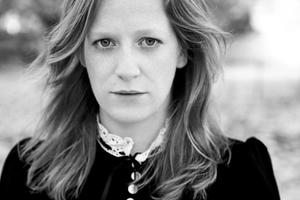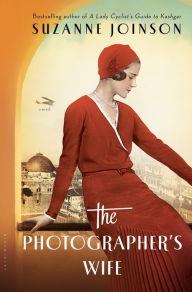
|
|
| photo: Simon Webb | |
Suzanne Joinson's debut novel, A Lady Cyclist's Guide to Kashgar, was long-listed for the 2014 IMPAC Dublin Literary Award. Her travel and nonfiction work has appeared in, among other places, the New York Times, Aeon, Vogue UK and the Independent on Sunday. She lives in Sussex, U.K. Joinson's second novel, The Photographer's Wife, was just published by Bloomsbury USA.
On your nightstand now:
On my nightstand now is a book called The Birds by Tarjei Vesaas. It's a tightly written, mesmerizing Norwegian novel. I've just discovered Vesaas and am obsessively working through his translated works, as he is a writer of great beauty and skill.
Also: Towards Another Summer by Janet Frame, Carthage by Joyce Carol Oates, The Art of Flight by Sergio Pitol and a book called The Gang, a biography (though it blurs the genre) taking one year--1802--in the life of Coleridge, William and Dorothy Wordsworth and Mary Hutchinson. I dip between novels and nonfiction.
Favorite book when you were a child:
When I was a young reader, my favorite books were Harriet the Spy by Louise Fitzhugh and a book about a toy Noah's Ark in which the animals come alive. I can't remember the author or find it by Googling, but I loved it.
Age 10-ish I read female heroines: Jane Eyre by Charlotte Brontë and Anne of Green Gables by Lucy Maud Montgomery. By early teens I was all about Henry Miller, Ernest Hemingway and Anaïs Nin (living the wild life in Paris, in other words).
Your top five authors:
I'm cheating because five is impossible:
Tie between Stevie Smith and Elizabeth Bishop
Tie between Elizabeth Bowen and Virginia Woolf
Tie between Vladimir Nabokov and Graham Greene
Tie between Janet Frame and Michael Ondaatje
Tie between Rebecca West and Marguerite Duras
Book you've faked reading:
In the past I have definitely faked reading Ulysses and Beowulf, but in the past few years I've read them so I no longer need to pretend! Well, actually, with Beowulf I listened to the wonderful Seamus Heaney audio, and the original I've read in tiny patches, so that counts as a bit of a fake. Book you're an evangelist for:
Book you're an evangelist for:
Drifting Cities: A Trilogy by Stratis Tsirkas. It's fascinating to read alongside, or before or after Lawrence Durrell's Alexandria Quartet, too. Even if you're not sure of Durrell, I really recommend Drifting Cities for a Greek perspective on life in the Mediterranean before and during World War II.
Book you've bought for the cover:
The first time I understood that a book could be a thing of beauty in itself was when I saw a copy of Alice in Wonderland with a tiny drawstring curtain on the front cover that pulled apart to reveal the white rabbit. I wanted it so bad. I didn't buy it (or wasn't allowed to) as it was out of my price range, but I have been covetous for it ever since.
Book you hid from your parents:
My parents were freewheelin' hippies so there wasn't much need to hide books from them. That said, I had a phase of engaging with Protestant Christianity between the ages of 10 and 12, and asked for a Bible one year, which raised eyebrows. I then let go of religion and progressed to troubled/angsty women of various sorts--Simone Weil, Anne Sexton and Leonora Carrington. I kept them under wraps, I guess out of a natural secretiveness.
Book that changed your life:
I can only answer this in decades as it's too difficult to choose one. Before 10: My Side of the Mountain by Jean Craighead George. I have always either been in the process of running away or very much wanting to, and this book showed me that it is possible, but has consequences.
Before 20: Slow Train to Milan by Lisa St Aubin de Terán. This is the first time I understood a novel could be a blur of travel writing and autobiography, yet still a novel.
Before 30: Oranges Are Not the Only Fruit by Jeanette Winterson--funny, clever, full of rage, full of heartache. It broke open the novel form for me.
Before 40: Virginia Woolf. Anything by her, but for grief and love in particular, To the Lighthouse and Mrs. Dalloway. They made me see the world differently.
Favorite line from a book:
"A story has no beginning or end: arbitrarily one chooses that moment of experience from which to look back or from which to look ahead." -- from The End of the Affair by Graham Greene.
Five books you'll never part with:
A hardback copy of T.S. Eliot's The Waste Land bought from Camilla's secondhand bookshop in Eastbourne, Sussex. A bashed-up paperback of My Family and Other Animals by Gerald Durrell. E.M. Forster's A Room with a View. Patrick White's Voss. A hardback of Carson McCullers's The Heart Is a Lonely Hunter, and Pale Fire by Nabokov, bought in Moscow. That's six, I know.
Book you most want to read again for the first time:
The Holiday by Stevie Smith or Excellent Women by Barbara Pym. I am drawn to melancholy spinsters. Or B.S. Johnson's Christie Malry's Own Double-Entry, which reads as though it was written yesterday, rather than in the '70s.

